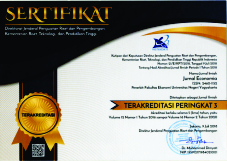Fraud Detection: Professional Skepticism and Quality Control System
Downloads
Abstract
Fraud is defined as an intentional violation of the law which causes harm to others. This study aims to determine the influence of Professional Skepticism and Quality Control Systems on Fraud Detection. The method used is descriptive and verificative analysis with a quantitative approach to 40 auditors in 13 Bandung City Public Accounting Firms. Primary data was collected through survey method data collection techniques through questionnaires. The data analysis method uses multiple linear regression analysis, which tests using SPSS 23.0 software for Windows. The results of this study show that Professional Skepticism and Quality Control Systems affect Fraud Detection. This research contributes as an evaluative tool for auditors to increase professional skepticism by implementing a quality control system in their assignments. The novelty of thisresearch is that auditors require professional scepticism and good quality control systems to detect fraud quickly and accurately.
Keywords:Professional Skepticism, Quality Control System, Fraud Detection
Downloads
Ardianingsih, A. (2019). Audit Laporan Keuangan. Jakarta: Bumi Aksara.
Arifuddin, R. H., & Indrijawati, A. (2020). Auditor Experience, Work Load, Personality Type, and Professional Auditor Skepticism Against Auditors' Ability In Detecting Fraud. Journal of Talent Development and Excellence, 12(2s), 1878–1890.
Budi Setya Nusa, I. (2021). The Effect Of Professional Skepticism & Auditor's Independence On Detection Fraud. Enrichment: Journal of Management, 12(1).
Darmawati, D., & Puspitasari, W. (2018). Pengaruh Penerapan Sistem Pengendalian Mutu (SPM) Terhadap Kemampuan Auditor dalam Mendeteksi Kecurangan. Prosiding Seminar Nasional Cendekiawan, 967–973.
Dewi, A. S., & Fakhrunnisa, A. (2020). Pengaruh Etika dan Sistem Pengendalian Mutu Terhadap Kemampuan Auditor dalam Mendeteksi Kecurangan Dengan Skeptisme Profesional Sebagai Variabel Moderasi. Prosiding Seminar Nasional Pakar, 2–13.
Faqih, F. (2020). Indonesia Peringkat 3 Negara Terkorup di Asia, Perlu Perampasan Kekayaan Koruptor. Retrieved September 11, 2022, from Merdeka.com website: https://www.merdeka.com/peristiwa/indonesia-peringkat-3-negara-terkorup-di-asia-perlu-perampasan-kekayaan-koruptor.html
Hadiyanto. (2018). Menteri Keuangan Jatuhkan Sanksi Auditor Deloitte Indonesia Atas Laporan Keuangan SNP Finance. Retrieved September 11, 2022, from KEMENKEU website: https://pppk.kemenkeu.go.id/in/post/menteri-keuangan-menjatuhkan-sanksi-deloitte-indonesia-atas-audit-snp-finance
Hadiyanto. (2019). Ditemukan Pelanggaran pada Audit Laporan Keuangan Garuda, Izin AP Kasner Sirumapea Dibekukan. Retrieved September 11, 2022, from KEMENKEU website: https://pppk.kemenkeu.go.id/in/post/ditemukan-pelanggaran-pada-audit-laporan-keuangan-garuda,-izin-ap-kasner-sirumapea-dibekukan
Harahap, R. U. (2021). The Effects of Quality Control System and Auditor's Competency Implementation on Auditor's Capability in Detecting Fraud on Public Accounting Office in Medan. Journal of International Conference Proceedings, 4(2), 561–570.
Hery. (2019). Auditing: Dasar-Dasar Pemerikasaan Akuntansi. Jakarta: Grasindo.
Indrasti, A. W., & Karlina, B. (2020). Determinants Affecting The Auditor's Ability Of Fraud Detection: Internal And External Factors (Empirical Study At The Public Accounting Firm In Tangerang And South Jakarta Region In 2019). Annual International Conference on Accounting Research (AICAR 2019), 19–22. Atlantis Press.
Karyono. (2016). Forensic Fraud. Yogyakarta: CV. Andi.
Kuntadi, C. (2017). Sikencur (Sistem Kendali Kecurangan) : (Menata Birokrasi Bebas Korupsi). Jakarta: Elex Media Komputindo.
La Ode, A., Wahyuniati, H., Angela, F., & Oktri, S. (2020). Auditor's Ability To Detect Fraud: Independence, Audit Experience, Professional Skepticism, And Work Load. Russian Journal of Agricultural and Socio-Economic Sciences, 11(107), 192–205.
Olsen, C. (2017). A Study of Professional Skepticism. Cham, Switzerland: Springer International Publishing.
Putri, K. M. D., Wirama, D. G., & Sudana, I. P. (2017). Pengaruh Fraud Audit Training, Skeptisisme Profesional, Dan Audit Tenure Pada Kemampuan Auditor Dalam Mendeteksi Kecurangan. E-Jurnal Ekonomi Dan Bisnis Universitas Udayana, 6(11), 3795–3822.
Sari, K. G. A., Wirakusuma, M. G., & Ratnadi, N. M. D. (2018). Pengaruh Skeptisisme Profesional, Etika, Tipe Kepribadian, Kompensasi, Dan Pengalaman Pada Pendeteksian Kecurangan. E-Jurnal Ekonomi Dan Bisnis Universitas Udayana, 7(1), 29–56.
Sugiyono. (2021). Metode Penelitian Kuantitatif, Kualitatif, dan R&D. Bandung: CV. Alfabeta.
Suhayati, E. (2021). Auditing Teori dan Praktik Dasar Pemeriksaan Akuntan Publik. Bandung: Rekayasa Sains.
Umar, H., Br.Purba, R., Safaria, S., Mudiar, W., Sariyo, H., & Karyaningsih. (2021). The New Strategy in Combating Corruption (Detecting Corruption: HU Model). Medan: Media Kreasi Group.
Widiyanto, D. (2019). Indonesia Duduki Peringkat 2 di ASEAN Soal Kecurangan Sektor Keuangan. Retrieved September 11, 2022, from krjogja.com website: https://www.krjogja.com/ekonomi/keuangan/indonesia-duduki-peringkat-2-di-asean-soal-kecurangan-sektor-keuangan/
Zamzami, F., Mukhlis, & Pramesti, A. E. (2018). Audit Keuangan Sektor Publik Untuk Laporan Keuangan Pemerintah Daerah. Yogyakarta: UGM Press.















